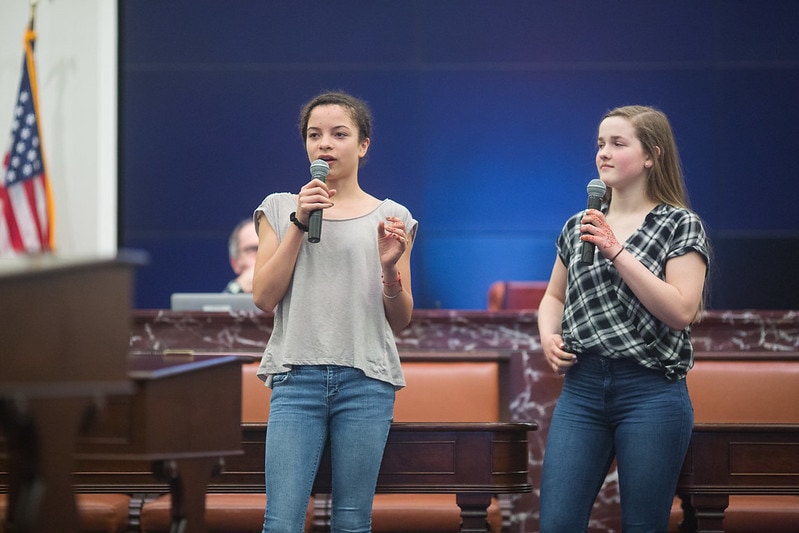Civic Conversations

Civic Conversations is a collaboration between the Kennedy Institute’s civic education programming and the community-building dialogic structure practiced by Essential Partners. Explore resources, activities, and lesson structures that support educators as they facilitate difficult conversations, create inclusive learning environments, raise complex discussions, and promote a safe space for students to consider their values and engage in their communities.
Policy simulations at the Kennedy Institute reflect the wide range of issues that face our country today. Students debate the best way to reform our immigration system, consider the balance between privacy and security, and think about how to meet the challenge of climate change. As in the real Senate, it’s natural that students will disagree on the best approach to many civic issues. This collection of resources will support educators as they prepare to discuss civic issues, either in preparation for a Kennedy Institute field trip or to practice listening, sharing, and learning in the classroom.
Dialogue Building Classroom Activities
These activities can be incorporated into many different kinds of classroom environments to build dialogue and understanding as students discuss civic issues.
- Connecting Questions This activity help students to know each other and choose how they’d like to be known, laying the foundation for difficult conversations. This activity from Essential Partners provides step-by-step instructions and example questions to build a classroom environment primed for future dialogue.
- Step Inside This House: Exploring Student Identities, Values, and Beliefs This activity from Essential Partners encourages an exploration of the values, traditions, and objects that hold meaning for students.
- My Political Autobiography This workbook from Essential Partners is designed to prepare students for a dialogue about their political beliefs. Through a series of questions and conversation starters that encourage personal reflection, students will consider their own political history, their civic voice and how they want to use it.
Teacher-Created Lesson Plans
These lesson plans, created by educators during the 2020 Civic Conversations Summer Institute, feature preparation for dialogue, skill building and full structured dialogue experiences for the classroom. Explore how reachers infuse dialogue into their classroom.
Dialogue Circle: Use this activity to build stronger dialogue and understanding within your classroom.
Dialogue Preparation: Pose these questions to help stimulate stronger dialogue between your students before class discussion.
Post Election Processing: Do your students have questions or thoughts they’re looking to consider about a recent election? Use this activity to both inform students and give them an outlet to express their feelings regarding electoral outcomes.
Talk Moves and Talking Stems: Utilize these sentence stems within your classroom to bolster student verbal expression or writing.
Student Generated Currents: Give your students the opportunity to share their knowledge and learn from one another about current events in your community, state, country, or international community.
Academic Experiences: This lesson will empower your class to discuss their feelings and thoughts regarding their own academic experience to foster reflection and encourage a positive outlook about their classmates and school community.
Balance Between Freedom and Safety: This dialogic lesson serves as a warm up to practice argument essay writing, preparing students to write independently in subsequent lessons.
Building Beloved Community: This lesson plan encourages students to deeply differences of identity to build a sense of community within your classroom and school.
The Purpose of Government: For the People: This dialogic lesson allows students to reflect on how varied experiences and perspectives of government can influence the way in which the institution of government as a whole is regarded.
Who am I? Who Are We?: In this multi-day lesson, students contemplate their own identity, the identity of their community, and the labels we use to consider people at any given place and time.
Sons of Liberty: Patriots and Terrorists: In these lessons, students will be able to engage in dialogic discussions about differing perspectives of the Sons of Liberty. Students will be able to identify, explain and analyze arguments to support that the Sons of Liberty were both patriots and terrorists.
Readings and Resources
These key resources provide a foundation for dialogic work.
- Start here: What is dialogue and how can it be used to build community? Stains, Robert R. “Cultivating Courageous Communities through the Practice and Power of Dialogue.” Mitchell Hamline Law Review (42:5). 2016.
- Reflect on creating an environment for dialogue: Gay, Roxane. “The Seduction of Safety, On Campus and Beyond.” New York Times. November 13, 2015.
- Why is it important to listen across difference? Adichie, Chimamanda Ngozi, “The Danger of a Single Story,” TED Talk. 2009.
Project Partners

Funders

This project won the 2019 Leonore Annenberg Institute for Civics (LAIC) prize, an award that carried funding for the activity. LAIC is a project of the Annenberg Public Policy Center of the University of Pennsylvania.
This project was also made possible in part by the Institute of Museum and Library Services.



